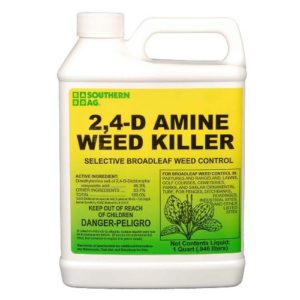
1. Compare-N-Save Concentrate Grass and Weed Killer – Best Long-Term Value
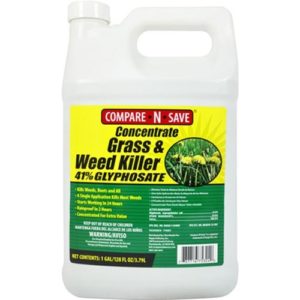
Compare-N-Save is a well known brand for weed killer. Their concentrate grass and weed product works extremely well to kill off weed problems at the root system, but it does take longer than a Roundup solution.
The issue is that the concentrated version seeks out the root system, rather than just killing the plant on the surface. You can still see results in a few days.
With a year’s supply, you can quickly take care of all the weeds trying to ruin your lawn. However, you should be careful to use it in a spot sprayer, as it will kill everything that it touches, including your grass.
2. Roundup 5725070 Extended Control Grass Killer – Best Overall Weed Killer
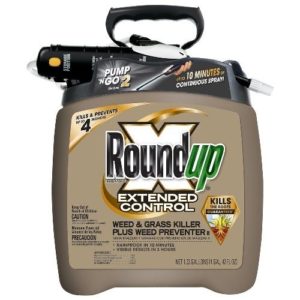
Roundup has always been the standard for weed killer. This version includes a pump to make it easy to spot spray and kill weeds in their tracks. The solution is rain proof within 10 minutes and shows results that very same day.
Roundup also provides a weed-killing guarantee, so if you do have issues with the quality, you can return it.
While the weed killer works well, the sprayer is a little difficult to control and makes it harder to get a spot spray the first few times. You’ll have to pump the sprayer to load up the solution and then spray it directly on the spot where you want to kill the weed. If you spray any of the areas around the weed, you will also kill the grass.
You can see that it starts working right away, but it may take 2 to 3 days to see the weed fully disappear. Customers reported that you can also spray areas that are weed-prone to get rid of future weeds as well.
3. RM43 Glyphosate Plus Weed Preventer – Most Potent Weed Killer
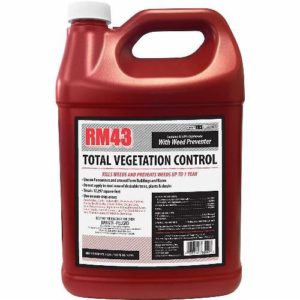
You have to be extremely careful with this next weed killer. As tested, the RM43 is one of the fastest working weed killers on the market. However, the extreme potency of its formula can destroy your lawn if you don’t practice spraying beforehand.
You want to make sure that you only use this on your toughest weed spots, as it may cause problems for your lawn if you spray too much.
This is truly a professional-grade quality weed killer. While it may not work right away, you should see results the same day, and after a few weeks, you shouldn’t see any more weeds growing in the same areas that you sprayed.
This solution does kill everything you spray, including shrubs, brush, vines, weeds, and other pesky plants that you don’t want to see popping up around your manicured lawns. If you have a larger area, you can use this solution with a hose attachment to kill any annoying vegetation growing on your property. We liked how quickly this weed killer worked and that weeds didn’t come back even after 60 days.
4. Roundup Extended Control Weed and Grass Killer – Great Weed Killer & Prevention Formula
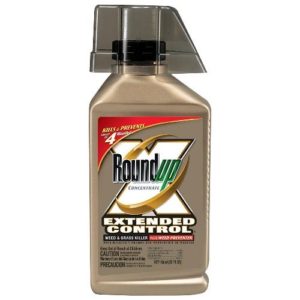
Roundup consistently makes great weed-killing products that are convenient to use. Unlike the other formula, this bottle doesn’t have a nozzle. You will need to use the concentrated solution with your own sprayer or hose. This is a new formula that is meant to kill existing weeds while also killing off new plants before they can grow for up to four months.
This formula works well to kill weeds at the root. You can spray this weed killer around a number of areas that are weed-prone, such as sidewalks, driveways, fences, foundation, curbs, and retaining walls to prevent any weeds for months. It starts working within a few hours, and you can see results the very same day.
As far as long-term prevention, Roundup’s concentrated formula has a potency that kills off plants quickly, preventing new weed growth right in the same exact spot that you sprayed. If you are looking for an accurate killer, this is the spot formula to use. So far, there have been no new, pesky weeds after 60 days. Customers report that this weed killer does prevent weeds from coming back even after four months as well.
5. Southern AG 2 Amine Weed Killer – Best Value Weed Killer

The 2,4-D Amine Weed Killer from Southern Ag is a wonderful concentrated formula that gets the job done. For the price, you really can’t beat the amount of formula you get. You can use about 1 to 4 pints per acre, depending on the number of plant pests cluttering your lawn.
This is best used to control broadleaf types of weeds, goathead stickers, clove plants, and other pesky weeds around wooded areas.
One thing we did notice is that it takes awhile to see results. It takes about 10 to 14 days to kill the weeds, but after that, you won’t see any more weeds for over 60 days. If you have a lot of acreage, this weed killer works extremely well to load up in a sprayer for bulk weed-killing action. Customers reported that this weed killer works extremely well for prevention and doesn’t cost as much as many other weed killers on the market.
Buyer’s Guide – Weed Killers
There are two ways that weed killers can get rid of weeds that are ruining your lawn:
- Contact Weed Killers: These are concentrated formulas that kill any plant on the spot. These show results within hours, so it almost instantly kills the weed. Although these work pretty fast, they typically destroy the plant above the soil but aren’t able to kill the roots. However, these are extremely potent and results-based formulas to use with weeds that spread through seeds. You can kill off these seeds by spraying down the area. This means that weeds like crab grass, types of nettle, plant mallow, and types of bindweed are annihilated by most contact products.
- Systemic Weed Killers: These formulas work because they can be spread into the root system and destroy the plant at the base. This means that weeds won’t grow and come back after a few days or weeks. They will likely be permanently gone, or at least gone for multiple months. These work the best for perennial types of weed plants, and they work extremely well for pesky weeds that won’t go away with other killer formulas.
Other Features to Look for in Weed Killers
- Kills weeds fast
- Rainproof in 1 to 2 hours
- Visible results in one week
- Prevents weeds from returning for 4 months
- Large size for extended long-term use
FAQ Weed Killers
Can a weed killer destroy grass as well?
Even if not all weed killers destroy grass on touch, there can be widespread harm to particular mixtures, particularly if your turf is not completely formed.
Selective weed killers are based on chemicals, such as broadleaf weeds, that target specific plant species. With specific weed killers, you should be able to spray lawn weeds easily without any disruption to the grass. Carefully read the manufacturer’s directions. Some types of turf may be resistant to certain chemicals used in the selective mix; each type is affected and should be explicitly marked on the bottle of weed killers. Stop spraying selective herbicides around grass seedlings which are failing. Any grass crop that is not completely developed in the soil then it is susceptible to weed killers.
Manufacturers sell weed killers in non-selective mixtures where all plant life, including your turf, is prone to dieback upon contact. If you are not positive about the weed species that attack your lawn or whether you have multiple weeds in one specific field, use a non-selective pesticide to destroy all the weeds and grass in the field. Careful application of non-selective sprays to avoid damage to adjacent lawns. Any herbicide residue should have decomposed after around two weeks, enabling you to reseed the infected region.
The spot application products should be your first course of action particularly if there are just a few weeds in the grassy lawn. To prevent overspray exposure to the grass, use chemical-resistant gloves to apply non-selective herbicide onto plants. Stop windy days because sprays will touch unlikely goals, including grasses.
The alternative method to weed killers to cope with weeds but leave the grass safe: Mow the lawn so the long blades create thick shade around the field at a high level. Through this technique, weed seeds and tiny seedlings neglect sunshine and die back naturally. Encourage deep irrigation for lush grass to 8 inches maximum. Strong roots cause plants to die back from the environmental resource scarcity.
What weed killer will be safe for pets?
A pet-friendly weed-killer in your lawn or garden will destroy weeds but will not harm your furry pets. These weed killers are usually made with natural ingredients including salt or sugar. Or you can apply DIY remedies such as boiling water to destroy plants.
Here are few pet-friendly weed killers:
- Green Gobbler Ultimate Vinegar Home & Garden is based on 20% vinegar, being free of glyphosate and other chemicals. It is fully biodegradable and certified for organic use.
- Dr. Kirchner Natural Weed Killer is based on salt water, soap and food vinegar;
- Natural Armor Weed & Grass Killer is based on citrus, sodium, glycerin, essential oil, water and acetic acid (vinegar). The manufacturer claims that this all-natural product can kill about 250 weeds;
- EcoClean Solutions Pure Vinegar is based on 30% white vinegar;
- Preen Weed Preventer is based on corn protein;
Avoid the chemical weed killers that contain 2,4-D (Trimec), sethoxydim.
When does a weed killer expire?
Check the label of the product. Most weed killers can last up to 3 years. Typically, the concentrates based on Glyphosate and/or 2-4-D could be used up to 8 years. The minimum shelf life is 2 years. To prolong the service life it is better to keep the weed killer in a dry, dark and cool place (below 400F), without the exposure to direct sunlight.
How many times do you have to apply a weed killer?
Not all handling methods of weeds are the same. Be sure you read the guidelines that your weed killer comes with, and appreciate them fully. Any chemicals may prove harmful to your lawn or pets. Such remedies may be used on the same patch of land several times with no harmful side effects, whereas others are purely one-use only. Check the label before using – the manufacturer of chemical weed killers gives strict directions about how frequently to apply their product.
The best time to cure weeds is when they thrive openly. This implies you can commence spring spraying and care, normally sometime in April. You would have to have the weed-killing program in order by late September / early October.
How successful the application is depends on the sort of weeds you handle. Young weeds that only germinate are particularly susceptible to weed killers. Mature plants can be much more challenging to contend with, as can annual weeds that have deeper root structures. There are often persistent weed types usually having waxy or rough coverings. Will be really hard to destroy these. Possibly some persistent weeds will kill and withstand herbicides!
How long does a weed killer take to work?
Several factors affect the longevity and onset of action of a certain weed killer. The first factor has to do with climate conditions. If you spray the herbicide in a damp or cold environment on the crop, it will function slower. It can harm the plants nearby, too. If you apply it to the plants for the first time, it could be a pleasant summer day.
The plant’s roots and leaves can consume the weed killer quickly and then evaporate residual concentrate into the breeze. It won’t do damage to surrounding plants. Usually, the spray can function well on a hot summer day. The weeds will start changing into yellow color over the next 48 hours. These unwanted plants would inevitably die within a week, or two.
Depending on the plants, the form of weed killer and the circumstances to which it is being used, the length of time herbicides need to function can differ. They typically take 2 to 4 weeks to totally rid your garden of the undesirable plants.
Does table salt kill weeds?
Shortly, yes. Salt, typically the table salt in the form of sodium chloride, is used to combat weeds quite a deal. It may also be combined with vinegar. Salt destroys trees, as with many other species. Sodium is a poisonous agent of the metal that quickly dissolves in liquids. A sprinkle of salt on weeds is also a natural herb killer for dogs. However, don’t use any salt on flower or vegetable beds; it can also destroy plants you choose to grow.
Are weed killers safe for children, dogs and cats?
The industry offers plenty of weed killers to maintain a garden and lawn weed-free. Many of those weed killers, though, are not suitable for kids and pets. Check the above-mentioned organic weed killers released by some all-natural brand – they are based on vinegar and salt water which are safe for cats, dogs and kids.
You may also consider making DIY all-natural weed killers for protecting your kids and pets:
- Pull the weeds manually;
- Add a compost layer with mulch to prevent the new weeds from growing;
- It is better to install landscape fabric under the garden stones if you want to skip weeds in walkways;
- Boiling water can also prevent weeds;
- Pure white vinegar can become a good organic weed killer;
- The mixture of chili pepper and sugar powder (1:1) for killing the vegetation with deep roots;
- Cornmeal can also help with unwanted weeds;
Can you use a weed killer before or after sowing grass seed?
Knowing a bit about herbicides/weed killers is critical, so you can make the right decision where to add seed in an area treated for weeds. The most popular types of herbicides are selective and systemic in weeds and feed materials. Selective herbicides target a plant species to destroy while systemic herbicides function by being ingested from the roots and eventually spread all over the plant, destroying it from the inside. Scan the mark on the container and see what sort of herbicide is being included in the plant and feed you are contemplating buying or purchasing. The bag label will inform you how long you would have to wait before adding seed to a lawn processed with that substance.
Weed killers can attack weeds until they germinate from seed-pre-emergent-or post-emerging as established plants. You may use a non-selective, post-emergent herbicide prior to seeding to suppress any weeds in the field to be planted. Any of these may be used to manage some emerging weeds up to 2 weeks before the seeding.
Post-seeding herbicides can not be used before new seedlings are created. Mowing and spot treatments may be applied to manage weeds before the field planted expands vigorously and needs irrigation. The setting times differ based on the sort of seed you are using and the environmental conditions.
Conclusion
If you are looking for a strong weed killer, then Roundup is likely the best formula to use, especially if you want to see the weeds gone quickly. However, long-term prevention is better with the extended control formula.

RoundUp will always be my favorite weed killer. I’ve been using the product for a decent amount of years and it continues to work wonders every single time. Never have I had any complaints and I highly recommend getting yourself some if you deal with weeds often.